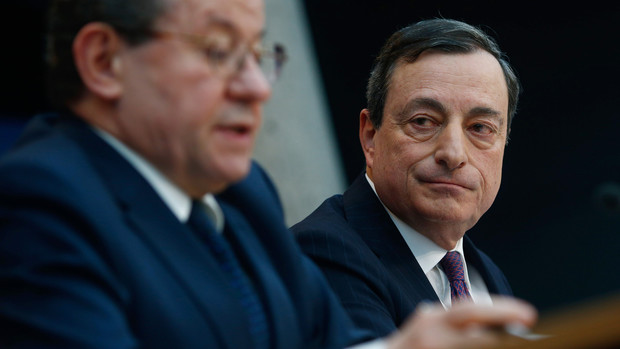Leaders: Big economic ideas Breakthroughs and brickbats
社论:重大经济思想突破与板砖
What economists can learn from the discipline's seminal papers
经济学家能够从这一学科的经典论文中所学到的
It is easy enough to criticise economists: too superior, too blinkered, too often wrong.
批评经济学家是再容易不过了:高高在上,眼界狭隘,错误频频。
Paul Samuelson, one of the discipline's great figures, once lampooned stockmarkets for predicting nine out of the last five recessions.
保罗·萨缪尔森,作为该学科的伟人之一,曾经为了预测到过去五次衰退中的9次而嘲讽股市。

Economists, in contrast, barely ever see downturns coming. They failed to predict the 2007-08 financial crisis.
相比之下,经济学家几乎从来都不去注意即将到来的危机。他们未能预测到2007-08年的金融危机。
Yet this is not the best test of success.
然而,这不是最好的成功验证。
Much as doctors understand diseases but cannot predict when you will fall ill, economists' fundamental mission is not to forecast recessions but to explain how the world works.
如同医生通晓百病却不能预测人们会何时得病一样,经济学家的根本任务不是预测衰退,而是解释这个世界是如何运转的。
Over the next six weeks we will be running a series of briefs on important economic theories that did just that—from the Nash equilibrium, a cornerstone of game theory, to the Mundell-Fleming trilemma, which lays bare the trade-offs countries face in their management of capital flows, exchange rates and monetary policy;
在今后六周中,我们将刊登一系列短文,论述那些恰恰是完成了这一任务的重要经济理论——从作为博弈论基石的纳什均衡,到阐述国家在管理资本流动、汇率和货币政策时所面对的取舍的蒙代尔—弗莱明三难困境;
from the financial-instability hypothesis of Hyman Minsky to the insights of Samuelson and Wolfgang Stolper on trade and wages;
从海曼·明斯基的金融不稳定假设到萨缪尔森和沃尔夫冈·斯托尔珀关于贸易和工资的洞见;
from John Maynard Keynes's thinking on the fiscal multiplier to George Akerlof's work on information asymmetry, the topic of this week's article.
从约翰·梅纳德·凯恩斯对财政乘数的思考到乔治·阿克洛夫关于信息不对称的研究,这是本周文章的标题。
These breakthroughs are adverts not just for the value of economics, but also for three other things: theory, maths and outsiders.
这些突破不仅是对经济学价值的弘扬光大,也是对理论、数学和圈外人等其余三者的广而考之。
More than ever, economics today is an empirical discipline.
如今,经济学比以往任何时候都是一门实证学科。
Thanks to the power of big data, economists can track consumer behaviour in real time or know almost precisely how much a good teacher is worth to the lifetime income of children.
由于大数据的力量,经济学家能够实时追踪消费者行为,近乎准确地知道一位好老师对于孩子终身收入的具体价值。
But theory remains vital.
但是,理论仍然非常重要。
Many policy failures might have been avoided if theoretical insights had been properly applied.
要是理论洞见得以正确地应用,许多政策失败本来是可以避免的。
The trilemma was outlined in the 1960s, and the fiscal multiplier dates back to the 1930s; both illuminate the current struggles of the euro zone and the sometimes self-defeating pursuit of austerity.
三难困境在上世纪60年代就已经有了轮廓,财政乘数也可以追溯至上世纪30年代;两者阐明了欧元区当前的困境以及时常是自欺欺人的紧缩追求。
The Nash equilibrium describes an outcome in which everyone is doing as well as they can given the strategies of others; it explains how countries compete with each other to cut tax rates in order to lure global capital.
纳什均衡描述的是一种参与其中的每一个人在得知其他人策略的情况下能做而且正在做的事情的结果;它解释了国家是如何为了吸引全球资本而竞相降低税率。
Nor is the body of economic theory complete.
经济理论本身也不完整。
Big gaps remain in the understanding of financial markets, for example, and on how best to regulate tech platforms like Facebook.
例如,在对金融市场的理解方面,在如何最好地监管像脸书这样的科技平台方面,仍旧存在着巨大的差距。
The shortfalls are particularly glaring when it comes to modern macroeconomics.
这些缺陷在当代宏观经济学中尤其明显。
From “secular stagnation” to climate change, the discipline needs big thinkers as well as big data.
从“长期停滞”到气候变化,这门学科既需要大数据也需要大思想家。
It also needs mathematics.
它还需要数学。
Paul Romer, who is heading to the World Bank as its chief economist, has railed against “mathiness”, the habit of using algebra to disguise ideological positions.
即将出任世界银行首席经济学家的保罗·罗默猛烈抨击了“泛数学化”(mathiness)——即使用代数来掩盖意识形态立场的习惯。
Economic papers are far too formulaic; models should be a means, not an end. But the symbols do matter.
经济学论文千篇一律公式化;模型应当是一种手段,不是一个目的。但是,这些符号的确至关重要。
The job of economists is to impose mathematical rigour on intuitions about markets, economies and people.
经济学家的工作就是用数学的严谨来影响关于市场、经济和民众的直觉。
Maths was needed to formalise most of the ideas in our briefs.
在我们这个系列中,数学之所以有需要是为了让大多数思想规范化。
In economics, as in other fields, a fresh eye can also make a big difference.
如同在其他领域一样,在经济学中,新人也能够带来翻天覆地的变化。
John Nash was only 21 when he set out the concept that became known as the Nash equilibrium;
纳什在提出闻名遐迩的纳什均衡概念时年仅21岁;
Mr Akerlof had not long completed his PhD when he wrote “The Market for Lemons”, the paper that made his name.
阿克洛夫在撰写让他成名的《柠檬市场》时刚修完了博士学位不久。
New ideas often meet resistance.
新思想经常碰壁。
Mr Akerlof's paper was rejected by several journals, one on the ground that if it was correct, “economics would be different”.
阿克洛夫的论文曾被多家期刊拒绝,其中一家的理由是:如果论文的思想是正确的,“经济学会截然不同”为理由的。
Recognition came slowly for many of our theories: Minsky stayed in relative obscurity until his death, gaining superstar status only once the financial crisis hit.
对于许多理论来说,承认是慢慢地到来的:明斯基在去世前一直相对默默无闻;只有在金融危机袭来时才获得明星地位。
Economists still tend to look down on outsiders.
经济学家仍然倾向于小看圈外人。
Behavioural economics has broken down one silo by incorporating insights from psychology.
行为经济学已经用吸收心理学这一真知灼见的行为打破了一座堡垒。
More need to disappear: like anthropologists, economists should think more about how individuals' decision-making relates to social mores;
更多的堡垒需要消失:如同人类学家一样,经济学家应当更多地去思考个人的决定如何与社会习俗相关连;
like physicists, they should study instability instead of assuming that economies naturally self-correct.
如同物理学家一样,他们应当研究不稳定而不是假设经济体自然地自我纠错。
This could make the maths trickier still.
这或许会让数学更加难以应付。
But not as hard as getting the profession to eschew its natural insularity.
但是,再难也没有让这个职业科避开其自然的偏狭那样难。



